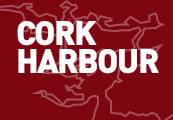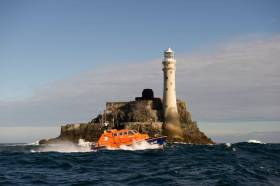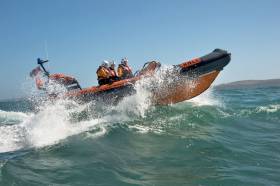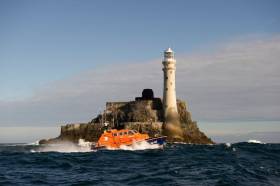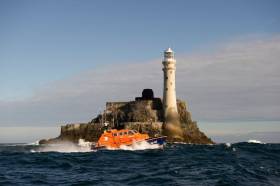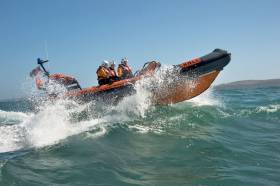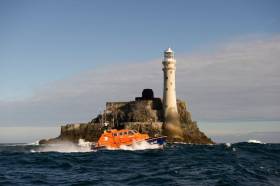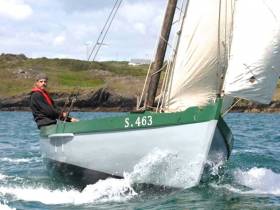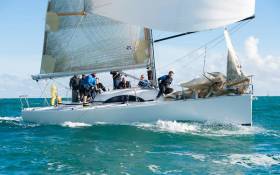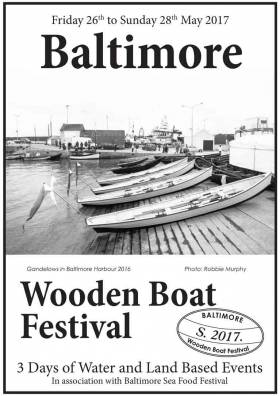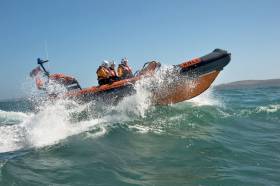Displaying items by tag: Baltimore
Baltimore Lifeboat Secures Vessels In Trouble At Crookhaven
#RNLI - In the first of two incidents yesterday morning (Thursday 3 August), Baltimore RNLI launched to reports of a vessel adrift in Crookhaven Harbour.
The vessel, a 4m Boston Whaler powerboat, had broken from its mooring in strong winds and was drifting outside the West Cork harbour.
There was no one on board the vessel, and weather conditions at the time were poor, with an easterly force 6-7 wind and 4-5m sea swell.
Baltimore's lifeboat arrived on scene at 8.38am, some 51 minutes after launch, and established a tow to bring the vessel back into the harbour, where it was secured to a mooring.
As the lifeboat was departing to return to station at 9.11am, the Irish Coast Guard contacted them to investigate another boat in trouble in the area.
The second vessel, a 20ft Merry Fisher pleasure boat with no people on board, had gone ashore on rocks in Crookhaven.
Due to the position of the vessel on the shoreline, coxswain Aidan Bushe decided to launch the Y-boat from the stern ramp of the lifeboat.
The Y-boat, with Kieran Collins and David Ryan on board, secured a tow and pulled the casualty vessel clear of the shoreline. The lifeboat then took up the tow and secured the vessel on a mooring.
Speaking following the callout, Baltimore RNLI volunteer lifeboat press officer Kate Callanan said: “It is advisable in such incidents, where boats get into trouble near the shoreline, to call the coastguard for assistance. This reduces the risk of people getting themselves into a dangerous situation.
“If you get into difficulty at sea, call 999 or 112 and ask for the coastguard.”
Bushe, Ryan and Collins were joined on yesterday’s callout by mechanic Sean McCarthy and crew members Jerry Smith and Don O’Donovan. Micheal Cottrell provided shore crew assistance at the lifeboat house.
#RNLI - Baltimore RNLI completed a busy weekend when the inshore lifeboat was launched on Sunday afternoon (30 July) to a report of an upturned vessel off Heir Island.
The volunteer lifeboat launched at 2.42pm arrived on scene to find a rigged Laser sailing boat, with no occupants, on the shore.
Baltimore’s RNLI crew conducted a sweep around the location of the vessel as other boats in the area, as well as the Irish Coast Guard helicopter from Waterford, joined in the search.
Conditions at the time were calm, with Force 3 to 4 winds and good visibility.
Within an hour, reports came in to the coastguard that the boat had got caught up on a static mooring while sailing earlier that morning. Unable to free the vessel, the sailor made their own way ashore, leaving the sailing boat fully rigged and stuck on the mooring.
Some time later the boat came off the mooring by itself and came ashore on its side, prompting a member of the public to raise the alarm when they came across it.
“We are delighted that there was a good outcome with this situation,” said Gerald O’Brien, Baltimore RNLI volunteer deputy launching authority.
“Always remember, if you get into difficulty at sea or witness a vessel in trouble from the shoreline, call 999 or 112 and ask for the coastguard.”
Baltimore RNLI previously launched twice on Friday (28 July) on two separate callouts, involving a Drascombe Lugger in distress and an emergency beacon activated on an offshore yacht, respectively.
Baltimore Lifeboat Responds To Drascombe Lugger Mayday
#RNLI - Just hours after launching to an alarm from a yacht’s emergency beacon on Friday morning (28 July), Baltimore RNLI’s all-weather lifeboat was back in action responding to a Mayday from a Drascombe Lugger taking on water in Schull Harbour.
The lifeboat launched at 6.11pm and proceeded to the scene amid calm conditions at sea, with a westerly Force 4 wind and good visibility.
Before they arrived, however, Schull Coast Guard’s inshore rescue boat was first on scene six minutes later and took the sailing boat with two on board under tow back to Schull Harbour.
“The sailors did the right thing this evening and raised the alarm when they found themselves in difficulty,” said Kate Callanan, Baltimore RNLI volunteer lifeboat press officer.
“We would like to commend our colleagues in the Irish Coast Guard who arrived on scene and brought the vessel to safety.”
#RNLI - Baltimore RNLI launched this morning (Friday 28 July) to locate a vessel sending an alarm from their positioning beacon off the coast of West Cork.
The Irish Coast Guard requested the launch just before 10am after it had picked up an alarm from an EPIRB (electronic position indication radio beacon) on a yacht half a mile south west of Cape Clear Island.
Coastguard staff at Mizen Head had no success raising the occupants of the yacht on their VHF so the Baltimore all-weather lifeboat was launched to investigate at the last known co-ordinates of the vessel.
Meanwhile, 10.30am the coastguard finally made contact with the yacht’s two occupants on their VHF and established that the EPIRB had been activated by accident.
Speaking after the callout, Baltimore RNLI volunteer lifeboat navigator Micheal Cottrell said: “It is important to ensure the secure fastening of an EPIRB on board a vessel and to regularly check that it is in good working order. Also, whilst out at sea it is important to keep radio watch on Channel 16.
“If you get into difficulty at sea, call 999 or 112 and ask for the coastguard.”
#RNLI - Baltimore RNLI assisted two sailors yesterday afternoon (Friday 14 July) after their motorboat broke down off the coast of West Cork.
The volunteer crew was requested to launch their inshore lifeboat at 2.25pm following a report from the sailors that their vessel had got into difficulty off Toe Head.
Helmed by Youen Jacob and with crew members Pat O’Mahony and Colin Rochford on board, the lifeboat launched immediately and was on scene in 25 minutes.
The 22ft motorboat had broken down half a mile west of Toe Head and had secured an anchor. Weather conditions at the time were relatively good, with a Force 3-4 south-westerly wind and a sea swell of 2-3m.
The lifeboat crew established a tow and brought the vessel safely back to Baltimore Harbour before returning to the station at 4.35pm.
“The sailors did the right thing today requesting assistance when required,” said Baltimore RNLI lifeboat operations manager Tom Bushe. “We would remind everyone enjoying our coast this summer to always respect the water.”
Shore crew in attendance at the station were Rianne and Jerry Smith, Kate Callanan, Marty O’Driscoll and Aidan Bushe.
#RNLI - Baltimore RNLI’s volunteer lifeboat crew has responded to three callouts over the last four days.
The first of the three was a medical evacuation from Cape Clear on Friday (7 July).
A woman from the island was suffering from chest pains and needed to be transferred to the mainland, where she was met by a waiting ambulance at the lifeboat station.
The lifeboat was crewed by Kieran Cotter, Sean McCarthy, Cathal Cottrell, Aidan Bushe and Don O’Donovan.
The following night (Saturday 8 July), the lifeboat carried out another medevac, this time from Sherkin Island after man suffered a serious fall from a height and required medical assistance.
The lifeboat crew were assisted on the island by a team led by Dr Jason from West Cork Rapid Response.
The casualty was evacuated to Baltimore, where an ambulance was waiting at the lifeboat station for transfer to hospital in Cork.
Crew on this callout were Kieran Cotter, Pat Collins, Jerry Smith, Don O’Donovan, Brian McSweeney, Jim Griffiths and Ronnie Carthy.
Finally, yesterday morning (Sunday 9 July) Baltimore RNLI’s inshore lifeboat was launched to go to the assistance of a RIB which had broken down off Cape Clear.
Mícheál Cottrell, a helm and crewman with Baltimore RNLI, was out with his sea safari boat on a tour with passengers when he happened upon the boat, with two people onboard, which was suffering engine problems.
Cottrell raised the alarm and Baltimore’s inshore lifeboat was requested to assist.
The lifeboat took the boat in tow to Baltimore, where it was berthed safely and the lifeboat returned to station.
Crew on the inshore lifeboat were helm Youen Jacob, David Ryan and Ryan O’Mahony.
Shore crew in assistance at Baltimore Lifeboat Station were Declan Tiernan, Sean McCarthy, Rianne Smith and Marty O’Driscoll.
It’s not every day you’re helped aboard a new boat by an international star of stage and screen writes W M Nixon. But it happened at the weekend in Baltimore, where A-list actor Jeremy Irons is now a quietly familiar part of the West Cork summer scene, and particularly the traditional and classic boat side of it.
So much so, in fact, that it would be unusual for an event such as last weekend’s Baltimore Woodenboat & Seafood Festival if this most noted of their local skippers didn’t sally forth to participate from his restored Kilcoe Castle, which is just round the corner on the shores of Roaringwater Bay.
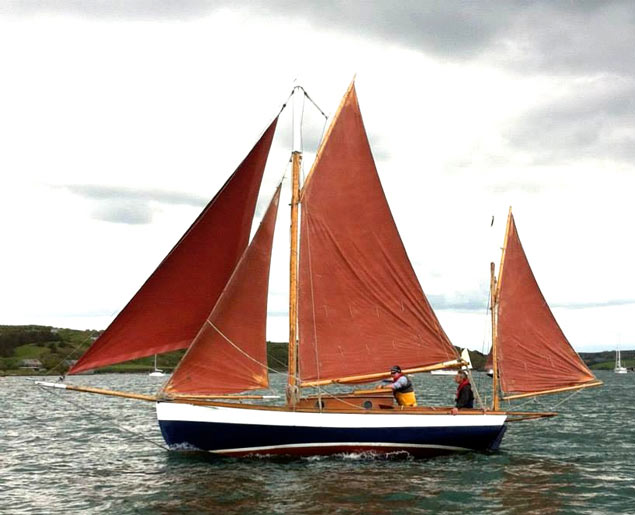 The pet boat. Jeremy Irons’ own sailing pride-and-joy in West Cork is the Willing Lass. As to her rig, the talk might go on all night as to whether she’s a ketch or a yawl.
The pet boat. Jeremy Irons’ own sailing pride-and-joy in West Cork is the Willing Lass. As to her rig, the talk might go on all night as to whether she’s a ketch or a yawl.
For those unfamiliar with the area, we hasten to say that the bay is named for the Roaringwater River which flows into it – Kilcoe Castle stands above reasonably serene waters, in the heart of an island-studded area where bustling Baltimore is within easy reach.
It was certainly beginning to bustle when the Ilen Boat-Building School of Limerick’s caravanserai – for no other word more aptly fills the bill – finally arrived in Baltimore with their eclectic collection of boats in tow or on trucks. And it was good to see that, as the larger fleet took up their berths at the harbour, there beside the quay was the familiar friendly shape of Jeremy Irons’ own little classic yawl, Willing Lass.
While the Ilen people had brought their usual range of Shannon gandelows and other craft, their little fleet in Baltimore included three dinghies of the Valentine Punt type, which originates from a 10ft punt built in 1926 at Passage West on Cork Harbour as a tender for John Valentine Sisk. His grandson Hal Sisk remembered so vividly the little boat’s wellnigh-perfect rowing ability, and her stability with remarkable load-carrying power, that he has made kits available to re-create the Valentine Punt in a much lighter Epoxy-built edge-glued version, which retains the use of clinker marine ply planks, but doesn’t require frames.
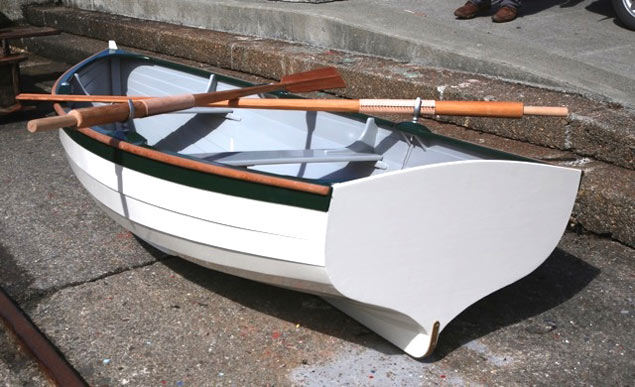 In honour of trainee boatbuilder Elan Broadley’s home county, the final touch of perfection for the new punt has been a Donegal green sheerstrake. Photo: Gary MacMahon
In honour of trainee boatbuilder Elan Broadley’s home county, the final touch of perfection for the new punt has been a Donegal green sheerstrake. Photo: Gary MacMahon
The Ilen Boat-Building School is always on the lookout for interesting new projects, so he donated one of the kits to its Limerick premises, and the job of building the boat was under-taken as a solo project by Elan Broadley from Donegal, with the school’s teacher Matt Dirr revealing his talents as a light-handed instructor.
For the young Donegal man, it was a lengthy and sometimes difficult process. But when the resulting 10ft punt was brought to the slip in Baltimore as the weather improved to a briskly sunny day on Saturday, it all became thoroughly worthwhile. The little boat simply looked a treat, the final perfection being a sheerstrake of Donegal green in honour of the builder.
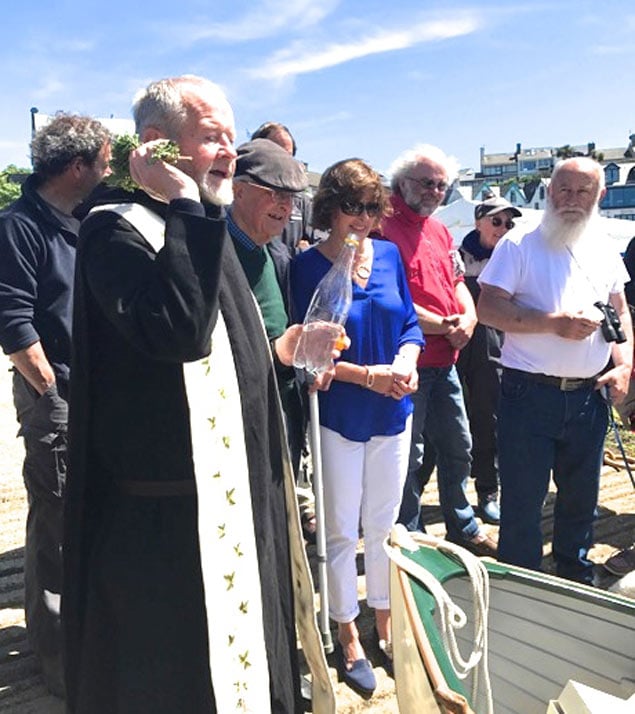 Brother Anthony of Glenstal Abbey blesses the new boat, assisted by Richard Bushe. Photo: Gary MacMahon
Brother Anthony of Glenstal Abbey blesses the new boat, assisted by Richard Bushe. Photo: Gary MacMahon
Elan’s mother Geraldine had come down from Donegal for this very special occasion, while Hal Sisk had come from Dun Laoghaire and leading traditional boat enthusiasts such as Paddy Barry had also travelled to be there with folk like Mary Jordan who keep the Baltimore Woodenboat show on the road, and it became one of those informal gatherings which somehow acquires its own momentum.
The boat was blessed by Brother Anthony Keane from Glenstal Abbey, who is a Director of the Ilen Boat-Building School, assisted by Richard Bushe on behalf of the Baltimore maritime community. A very special cake, dedicated to Hal and Matt, was ceremoniously sliced and consumed with enthusiasm, and then after the two other Valentine Punts had been sent off to row about in the inner harbour as a welcoming escort, the new boat took to the water for the first time.
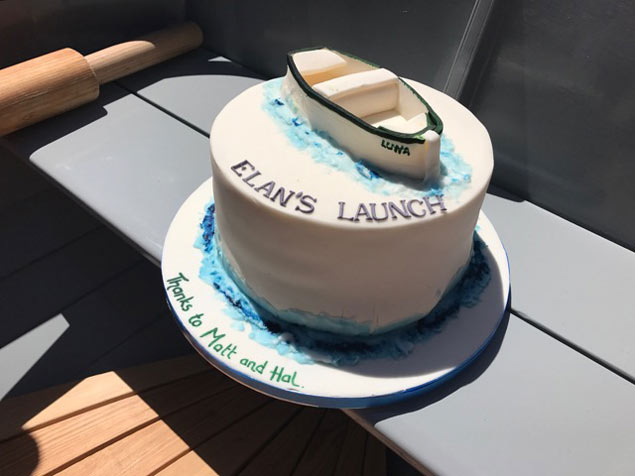 A very special cake gave thanks from Elan Broadley to Hal Sisk, the donor of the boat-building kit, and Matt Dirr the Ilen School Instructor. Photo: Gary MacMahon
A very special cake gave thanks from Elan Broadley to Hal Sisk, the donor of the boat-building kit, and Matt Dirr the Ilen School Instructor. Photo: Gary MacMahon
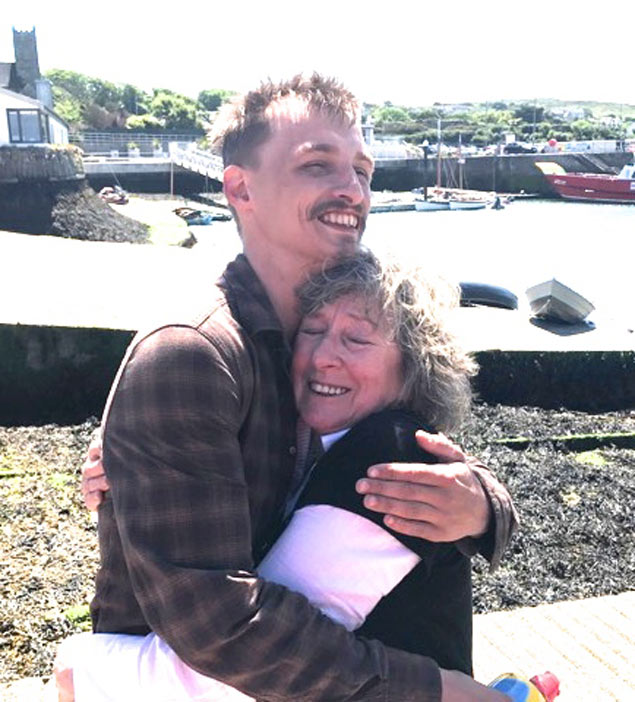 “Well done!” Mary Jordan of the Baltimore Woodenboat & Seafood Festival gives her warmest approval to Elan Broadley for his efforts. Photo: Gary MacMahon
“Well done!” Mary Jordan of the Baltimore Woodenboat & Seafood Festival gives her warmest approval to Elan Broadley for his efforts. Photo: Gary MacMahon
It was now that Hal Sisk reckoned he’d the perfect opportunity to demonstrate the Valentine Punt’s excellent load-carrying capacity, and somehow Jeremy Irons – who has long taken a close interest in the Ilen project – was roped in to help people aboard and send a worthwhile payload afloat. Like the good trouper he is, he threw himself into the role with relish, and the new dinghy – with Hal himself doing the rowing from the useful bow position – showed she could confidently carry six people, including the young boat-builder’s mother.
 Always a willing trouper – Jeremy Irons enthusiastically took on he role of quayside attendant and boat loader
Always a willing trouper – Jeremy Irons enthusiastically took on he role of quayside attendant and boat loader
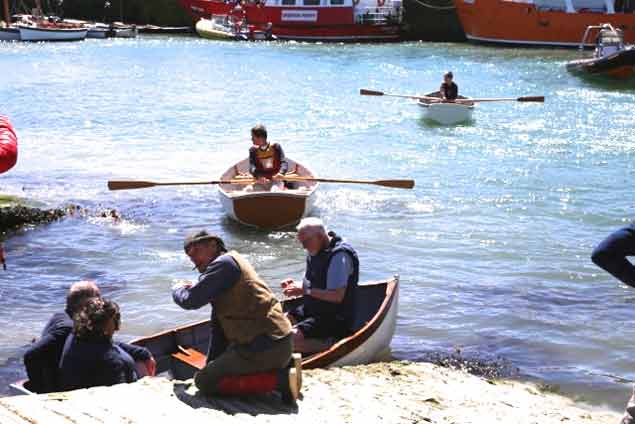 “Come on, there’s plenty of room for lots more......” Jeremy Irons piling them in, while the two sister-punts row out into the harbour. Photo: Gary MacMahon
“Come on, there’s plenty of room for lots more......” Jeremy Irons piling them in, while the two sister-punts row out into the harbour. Photo: Gary MacMahon
It’s not every day that you can travel all the way from Donegal to West Cork to see the first boat built by your son being launched in front of such an extraordinary and approving group. And then to be helped on board that same boat by a real international superstar successfully pretending to be a quayside attendant....well, it made Geraldine’s day.
In fact, it made everyone’s day. In this one charming little launching ceremony, the message of hope which is embodied in the Ilen Boat-Building School became clear for all to see, share and understand.
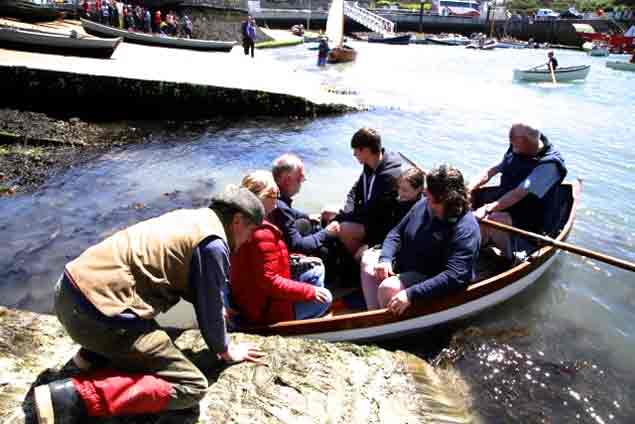 Sending them on their way – with Hal Sisk on the oars, the little punt takes the load. Photo: Gary McMahon
Sending them on their way – with Hal Sisk on the oars, the little punt takes the load. Photo: Gary McMahon
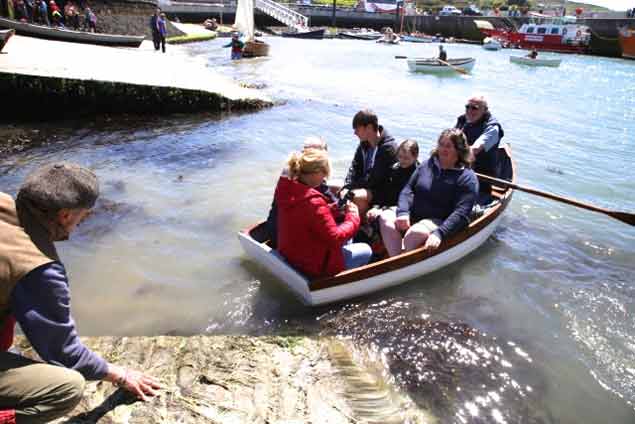 Job done. Elan’s mother Geraldine (red jacket) floats for the first time in the punt her son built. In the interests of safety, they stayed strictly in the shallowest water, but the little punt carried the load very well. Photo: Gary MacMahon
Job done. Elan’s mother Geraldine (red jacket) floats for the first time in the punt her son built. In the interests of safety, they stayed strictly in the shallowest water, but the little punt carried the load very well. Photo: Gary MacMahon
Despite some interruptions from either too much or too little wind, the regular club sailing programme for 2017 is now fully under way, and this weekend is additionally so well filled with major regional and national events that you could be forgiven for thinking it’s high summer already. W M Nixon tries to make sense of it all.
How on earth is anyone expected to fully understand, let alone explain, a global activity which today sees the extraordinary 1,500 boat Festival of Sail in the Morbihan in France putting in its final races and fleet manoeuvres, before everyone joins in the end-of-show Parade of Sail tomorrow?
Yet at the same time, across the Atlantic in Bermuda, the first moves in the 35th edition of the America’s Cup, arguably the world’s oldest international sporting contest as it goes back to 1851, are getting under way, involving sailing machines for which the word “boat” seems somewhat inappropriate.
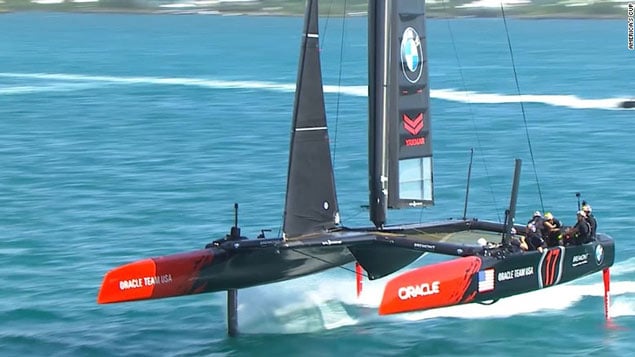 It’s difficult to think of them as anything other than “sailing machines,” but America’s Cup rules reckon they are boats
It’s difficult to think of them as anything other than “sailing machines,” but America’s Cup rules reckon they are boats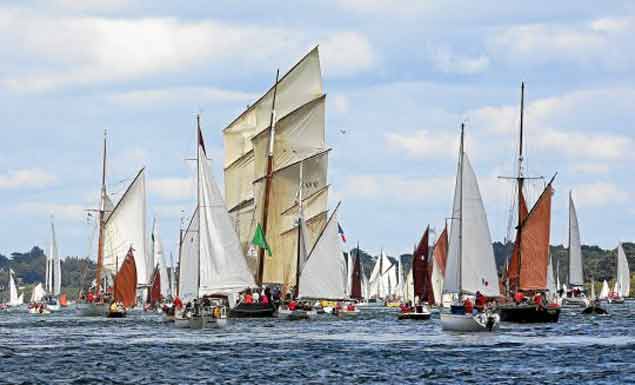 Some of the huge fleet at the current Morbihan festival. In their midst is the bisquine-rigged La Cancalaise from Cancale. In the days of piracy, smuggling and privateering in the English Channel, it was reckoned that any vessel setting this demanding high-performance rig was up to no good, and therefore a legitimate target for government ships
Some of the huge fleet at the current Morbihan festival. In their midst is the bisquine-rigged La Cancalaise from Cancale. In the days of piracy, smuggling and privateering in the English Channel, it was reckoned that any vessel setting this demanding high-performance rig was up to no good, and therefore a legitimate target for government ships
Then too, the world sailing community is still digesting the revelation that future generations of boats in the Volvo World Race, which now rivals the America’s Cup for international attention, will be in effect IMOCA 60s with mega-foils.
And in addition to that, at each in-harbour stopover, the world-girdling Volvo Ocean Race crews will be expected to do a series of races in smaller but very potent multi-hulls which will thrill spectators with their closeness to the watching crowds and to each other, with hair’s breadth misses – and ideally the occasional not-too-serious shunt - a central part of the action.
All these major international events then have to be fitted around the reality that, like it or not, sailing is one of those minority sports that need the Olympics more than the Olympics need sailing. In other words, we have to keep the decks clear of other major international fixtures to give total attention when the next sailing Olympiad at Tokyo comes along in 2020.
For those who would snort in derision at such a suggestion, do tell us what you were doing (if you can remember) while the rest of Ireland held its breath and watched as Annalise Murphy was sailing towards her Silver Medal on August 16th 2016?
Nevertheless, having taken all that into account, the reality is that the top end of sailing is reaching ever-higher peaks of performance in everything, and inevitably using boats and equipment of unimaginable expense. So except for the Morbihan event - whose ethos is found in going the other way, with total democratic involvement for everyone - how on earth can ordinary sailors relate to what the participants in the America’s Cup and the Volvo World Race are experiencing?
Let’s be honest. We can only do so - if at all - with some mighty leaps of the imagination. The result is that many of us are going back to the knitting. We’re going back to trusted events, and staying with sailing boats which may not be in the first flush of youth, but at least they mean something to us.
We know that with them, we can find racing which bears some relation to everyday life rather than the other-world dreamscape which is the America’s Cup or the Volvo World Race.
Over the next two weekends in Ireland, this racing of familiar boats will move up a couple of gears, as this weekend is the Bank Holiday in the North, and in a week’s time the extra day off is in the Republic. So keen sailors who see their programme on an all-Ireland basis somehow manage to convince themselves that we have two all-island Bank Holidays on the trot.
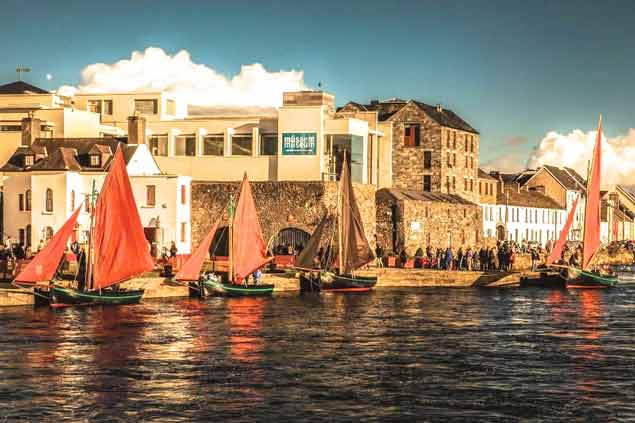 Galway hookers gather at the Claddagh, while above them is the Galway City Museum, currently staging a Marine Science Exhibition.
Galway hookers gather at the Claddagh, while above them is the Galway City Museum, currently staging a Marine Science Exhibition.
Thus the ongoing Claddagh Festival with all varieties of Galway Hookers on show in the City of the Tribes is also managing to welcome Viking longships which have been brought overland from their home port of Ardglass in County Down. And at least the northerners have the proper claim that, for them, Monday is a free day to get their boats home again.
That equally applies to northern visitors to the Woodenboat Festival in Baltimore, which got going last night and should have good weather from midday onwards today, and through tomorrow’s colourful programme. Nevertheless for those with a day job to think about, the long haul home on Sunday night can become very long indeed.
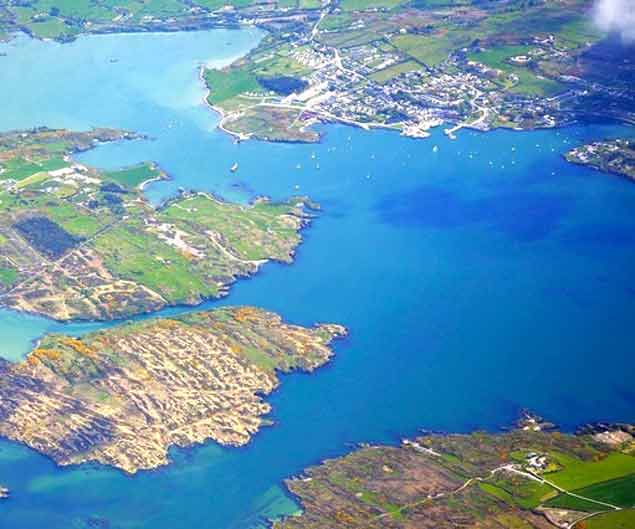 Baltimore in West Cork - the perfect location for a friendly Woodenboat Festival
Baltimore in West Cork - the perfect location for a friendly Woodenboat Festival
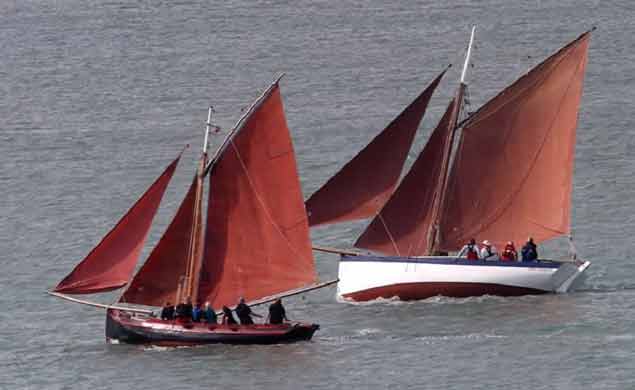 It’s not quite racing, but when a Galway hooker (left) finds competition at Baltimore Woodenboat Festival with a traditional West Cork boat, there’s certainly an added edge to the sailing. Photo Sheena Jolley
It’s not quite racing, but when a Galway hooker (left) finds competition at Baltimore Woodenboat Festival with a traditional West Cork boat, there’s certainly an added edge to the sailing. Photo Sheena Jolley
Both these events are traditional annual festivals in which racing plays only a small – if any – part. But even in competitive sailing, all the signs are that people are returning to beef up the numbers and competition in events which served them well in the past, yet had slipped in the popularity ratings owing to a change in behavioural patterns (the modern family is an extremely demanding taskmaster), and the ill-effects of the economic recession.
Everyone has been heartened by the new strength of the Irish Sea Offshore Racing Association (to which we’ll return in a minute), but today the top of the agenda is the Scottish Series, getting up to speed at the lovely little port of Tarbert on Loch Fyne. Of course, numbers are nothing like the eventually unmanageable crowd of boats which became a feature of this series about twenty years ago. But nevertheless there’s a tidy fleet at Tarbert, and a strong Irish contingent are in with more than shout of bringing home the big prize.
 Packing them in – the Scottish Series fleet in Tarbert
Packing them in – the Scottish Series fleet in Tarbert
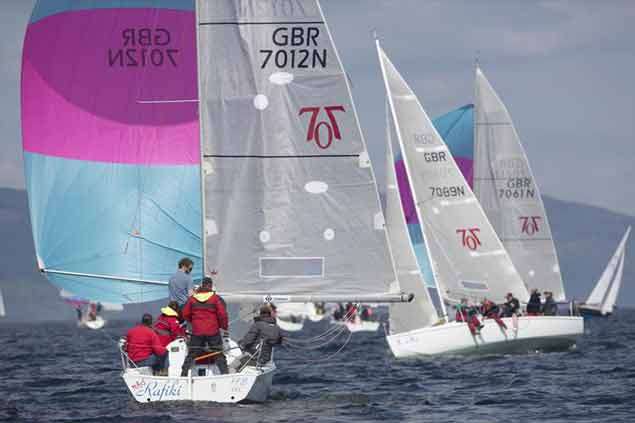 The Hunter 707 fleet provided some of the best racing at last year’s Scottish Series
The Hunter 707 fleet provided some of the best racing at last year’s Scottish Series
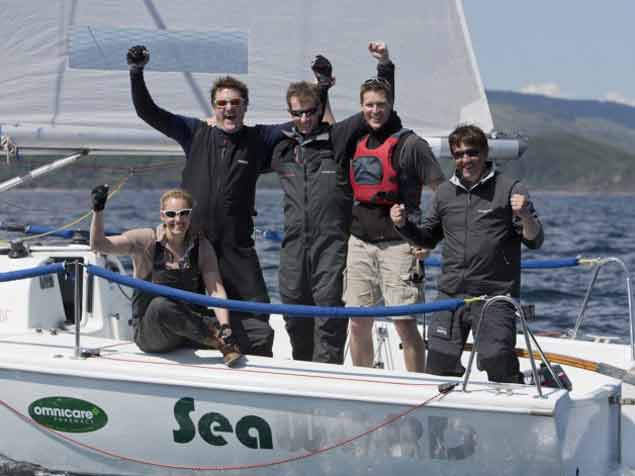 Dara O’Malley (second left) and his winning crew on Seaword, which made him Afloat.ie “Sailor of the Month” for May 2016. Photo: Marc Turner
Dara O’Malley (second left) and his winning crew on Seaword, which made him Afloat.ie “Sailor of the Month” for May 2016. Photo: Marc Turner
Last year it was one of the diaspora, Dara O’Malley originally from Westport but now sailing on the Firth of Forth with his Hunter 707 Seaword, who was tops. While he may be Scottish-based, he was home among us in January to receive his Afloat.ie “Sailor of the Month” Award for May 2016 at the National Sailing Awards in the RDS.
He is defending this weekend, and another former overall winner is the irrepressible Rob McConnell from Dunmore East. With an almost entirely Waterford Harbour SC crew, Rob’s A35 Fool’s Gold is reportedly in particular good trim this year, so definitely a boat to watch.
Other strong performers from Ireland over in Tarbert include the Kelly family from Rush with their J/109 Storm, and that highly individualistic helmsman renowned for pulling rabbits out of the hat, Johnny Swan with his classic Half Tonner Harmony from Howth. Strangford Lough is sending the notably steady perfomer Jay Colville with his successful First 40 Forty Licks, while all the way from Cork Harbour is the First 36.7 Altair (K Dorgan & J Losty) of Cove Sailing Club, recalling the enthusiasm of a high order which used to be a feature of the O’Leary family’s years with the Corby 36 Antix from Crosshaven, an overall winner in Scotland on more than one occasion.
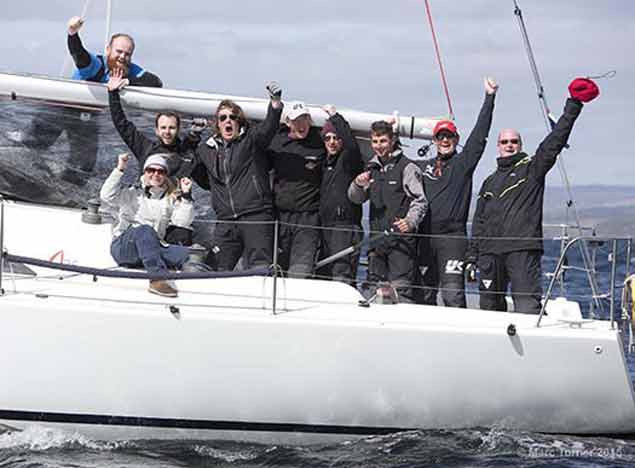 They might do it again......Rob McConnell (fourth left) and his mostly Dunmore East crew after winning the Scottish Series in 2015 on the Archambault 35 Fool’s Gold. Photo: Marc Turner
They might do it again......Rob McConnell (fourth left) and his mostly Dunmore East crew after winning the Scottish Series in 2015 on the Archambault 35 Fool’s Gold. Photo: Marc Turner
The continuing growth of the J/109s, which have needed ten years to become an overnight success in Ireland, is shown by the additional presence in Scotland of two of Storm’s sister-ships from home, Andrew Craig’s Chimaera and John & Brian Hall’s Something Else, while a smaller manifestation of the J Boat range’s ubiquitous nature is the participation of Stephen Quinn’s J/97 Lambay Rules from Howth.
It’s an interesting crew setup, as Lambay Rules’ core team, including Stephen Quinn himself, have been seen racing in the elegance of Stephen O’Flaherty’s Spirit 54 Soufriere, whose claims to fame include a role in a James Bond movie. Despite the obvious differences between the two boats, the key personnel – including Stephen O’Flaherty – moved aboard the little Lambay Rules for last year’s Volvo Round Ireland Race, and despite being one of the smallest boats in the fleet (in fact, I think she was the smallest), at several stages they were leading their class, but not alas at the finish.
Their determined involvement in Scotland says much for their continuing zest in the game, but meanwhile back home the presence of so many significant boats over in Scotland has done little to diminish numbers for this morning’s ISORA Race from Dun Laoghaire to Arklow, which will see 28 starters.
PHOTO HERE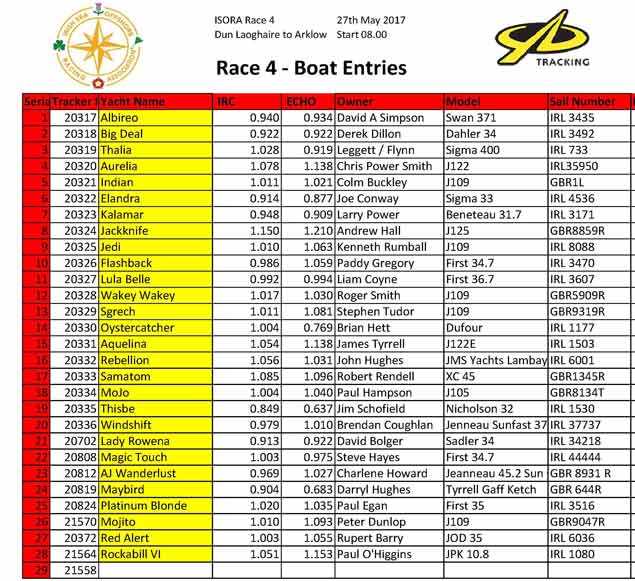 The lineup for today’s ISORA-Dun Laoghaire Race
The lineup for today’s ISORA-Dun Laoghaire Race
Very senior ISORA contenders have a feeling that they must have raced to Arklow before, but maybe they’re confusing it with ISORA races which took in the Arklow Lightvessel as a mark of the course, and it’s undoubtedly a very long time since a lightship was on the Arklow Bank.
Certainly ISORA Chairman Peter Ryan says that this is the first time an ISORA Race has finished in Arklow, where the local sailing club has been expanding in a healthy style, while on the bigger canvas, the Tyrrell family with their succession of ever-larger and successful craft in the J Boat range – all called Aquelina – has done much to have Arklow SC punching way above its weight on the national offshore racing scene.
The Tyrrells were too far ahead of the curve when they got their first Aquelina, a J/109, shortly after the new marque was introduced. Their hopes of getting a semi-One-Design J/109 class going didn’t take off. But today, racing their current J/122E Aquelina back to their home port, they’ll ruefully observe that there are at least five J/109s racing with them, a goodly number when we remember that three of the Dublin class are in Scotland, and several others are staying in Dun Laoghaire to do today’s Dublin Bay SC race.
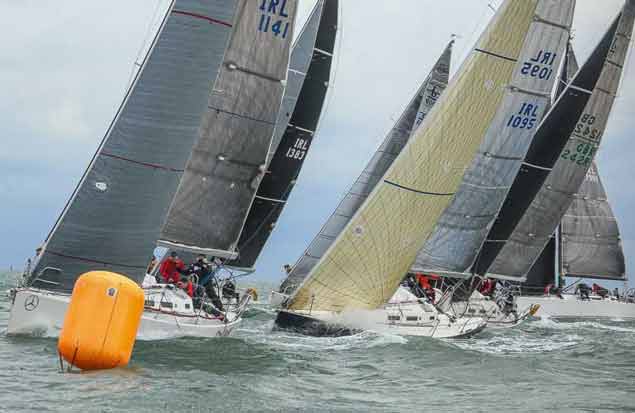 It has taken them ten years to become an overnight success, but the J/109s are now a very significant presence in Dublin Bay. Photo: Afloat.ie
It has taken them ten years to become an overnight success, but the J/109s are now a very significant presence in Dublin Bay. Photo: Afloat.ie
However, one of the latest J/09s to join the Greater Dublin class is Indian, owned by Colm Buckley and Simon Knowles of Howth. They won the two-handed class in the 2015 Dun Laoghaire to Dingle race in the smaller Elan Blue Eyes, but this race to Arklow is their first serious offshore challenge in the J/109. It will be a proper test, as the J/109 contingent includes Peter Dunlop’s Mojito and Stephen Tudor’s Sgrech, both from Pwllheli and respectively first and second of the J/109s in the Holyhead to Dun Laoghaire race a fortnight ago.
But the boat for everyone to beat is Paul O’Higgins’ JPK 10.80 Rockabill VI, whose remarkable all-round ability was demonstrated with the overall win in the increasingly breezy Holyhead-Dun Laoghaire Race of May 13th. These JPK 10.80s are superb performers across a wide range of conditions, and the simple fact of knowing they have such a good boat under them is an added encouragement for Paul O’Higgins and his crew of all the talents.
The highly technical approach of racing a boat like Rockabill VI is a whole world away from the intimate world of wooden boat adherents getting together in Baltimore, or the historical, cultural and music-laden gathering of the traditional craft and their visiting Vikings in Galway. But that’s the way it is in the very wide world of boats and sailing. In the end, we’re all members of the same exceptionally diverse sailing community.
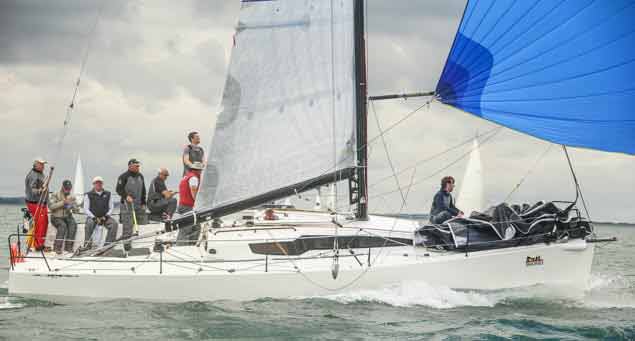 The boat to beat – Paul O’Higgins JPK 10.80 Rockabill VI is a superb all-rounder
The boat to beat – Paul O’Higgins JPK 10.80 Rockabill VI is a superb all-rounder
The annual Baltimore Wooden boat Festival this weekend (full dates are Friday 26th to Sunday 28th May) provides the perfect setting for a remarkable range of craft of all shapes, sizes and rigs writes W M Nixon. It brings with it all sorts of celebrations and activities afloat and ashore to match an occasionally – indeed, frequently – eccentric gathering of traditional and wooden boat fans.
Scroll down this story to read the full programme below.
In fact, there’s noting quite like it on sea or land anywhere in Ireland, as it’s a heady mixture of craft of types sometimes half as ancient as time itself, testing themselves afloat and against each other, with all of it including the inter-boat banter which is so much part of the sport.
Best of all, the meteorological portents are good - it looks as though it is going to happen in what might well be a weekend of better than reasonably good summer weather, so we can expect the hospitable sea-minded West Cork port to be totally en fete afloat and ashore.
They’ll be coming from all over Ireland and beyond, and a significant presence will be the Ilen Boat Building School from Limerick. Not only is their 57ft ketch Ilen nearing restoration near Baltimore at Oldcourt, but they will be bringing a collection of craft built by trainees in the school, where they also built the deckhouses and spars for the Ilen.
A focus of close attention will be one of the smallest boats of all, the 10ft Valentine Punt, which is assembled from a laser-cut kit based on marine plywood. The basic design used is a 10ft dinghy built in the 1920s in Passage West on Cork Harbour for John Valentine Sisk, and it his grandson, maritime historian Hal Sisk, who vividly remembers what a special pleasure it was to row this elegant yet practical little boat.
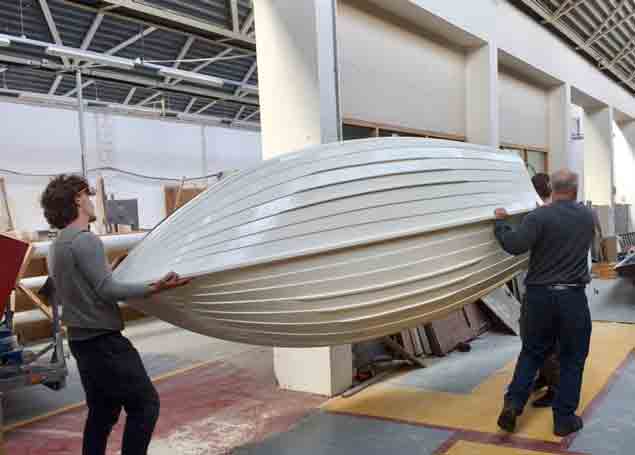 The new Valentine Punt built by Elan Broadley in the Ilen Boatbuilding School in Limerick is remarkable for its lightness. Photo Gary MacMahon
The new Valentine Punt built by Elan Broadley in the Ilen Boatbuilding School in Limerick is remarkable for its lightness. Photo Gary MacMahon
Thus he got the idea of making building kits available, using edge-glued (with epoxy) plywood “planks” to emulate the original’s traditional clinker construction, thereby providing a boat which is lighter yet more durable with much less maintenance.
When Hal heard the Ilen people were looking for a dinghy to act as tender for their vessel, he donated one of the kits to the school. And this newest Valentine Punt, which will debut in Baltimore at the weekend, has been built in the Limerick school by Elan Broadley from Donegal.
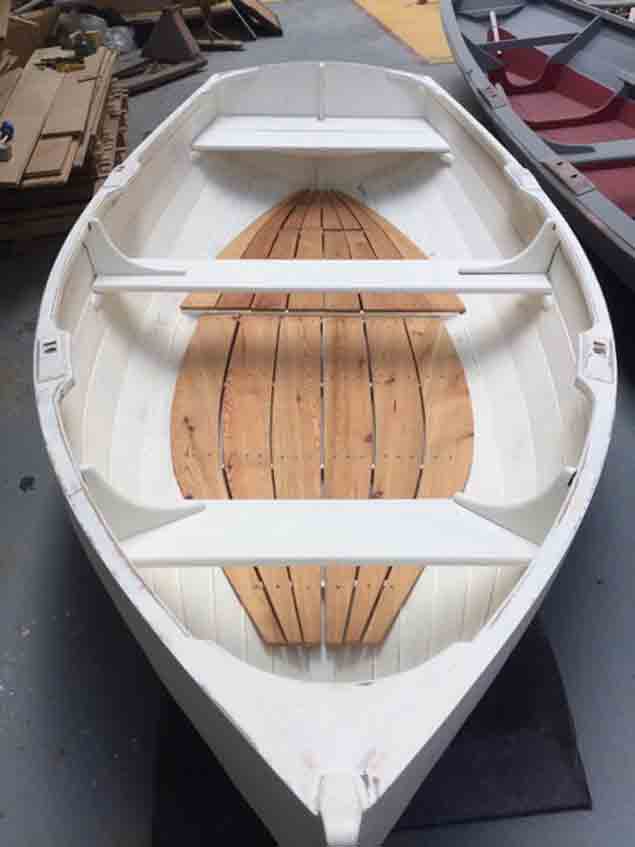 With edge-glued “clinker” construction, the new Valentine Punt is easily maintained – unlike a traditional clinker boat as the bilges can be cleaned in seconds. Photo: Gary MacMahon
With edge-glued “clinker” construction, the new Valentine Punt is easily maintained – unlike a traditional clinker boat as the bilges can be cleaned in seconds. Photo: Gary MacMahon
He had no experience of boatbuilding when he started, yet with patience he has learned as he worked, under instruction when needed. It may have taken 500 hours in all for him to complete the job, but the result is a lovely little boat. Among those there to celebrate with her proud builder at Baltimore this weekend will be his mother down from Donegal, and Hal Sisk, who learned to row in the original boat more than sixty years ago.
So in Baltimore this weekend, the mood in the sunshine will be of nostalgia and anticipation. Soon, the Ilen will launch. And once she is in full commission, the focus will turn to building a re-creation of Conor O’Brien’s famous world-girdling 40ft ketch Saoirse, originally built in Baltimore 95 years ago. Her re-birth comfortably in advance of her Centenary in 2022 is a very worthy target.
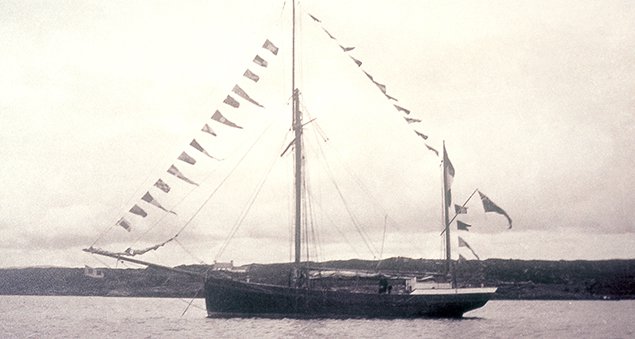 Ilen on her first commissioning day at Baltimore in 1927
Ilen on her first commissioning day at Baltimore in 1927
#RNLI - A week of engine troubles around the Irish coast continued yesterday morning (Tuesday 9 May) when Baltimore RNLI went to the aid of a fishing boat on passage from France to Kerry.
The lifeboat launched to the vessel at 7.10am, taking it under tow to Baltimore where it was brought alongside the pier at 10.40am.
The crew on the lifeboat call were coxswain Aidan Bushe, mechanic Cathal Cottrell, Colin Whooley, Don O’Donovan, Jerry Smith, Kieran Collins and David Ryan.
Yesterday’s callout came after Skerries RNLI launched to a motor boat in difficulty off Rockabill on Sunday, and the Rosslare Harbour lifeboat assisted a motor yacht off the Wicklow coast last Wednesday.


